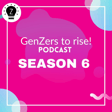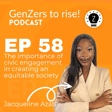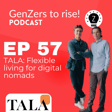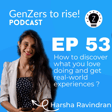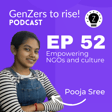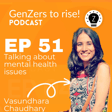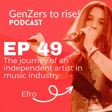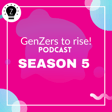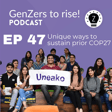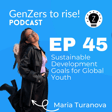Become a Creator today!Start creating today - Share your story with the world!
Start for free
00:00:00
00:00:01

Talking about product management with Iris Guo
In this episode we are talking to Iris Guo. She works as an product management intern at a Google X project and she is the founder of Neutrify. A chrome extension that helps reduce people’s carbon footprint. We learn about the role of a product manager and how technology can be used to tackle issues like climate change.
Iris Guo social media: https://lnkfi.re/iris-guo
Follow ChangemakerZ at https://go.changemakerz.org/follow
Episode's link: https://podcast.changemakerz.org/iris-guo
Produced by Vasilis Skarleas
Transcript
Introduction and Mission
00:00:01
Speaker
Hello everyone, I'm Saloni. And I'm Vassilis. We run Changemakers team, a student room initiative that aims to empower, educate and connect gen players interested in entrepreneurship.
Guest Introduction: Iris Guo
00:00:14
Speaker
We interview teenagers with impactful projects and create resources to help you change the world. If they can't do it, so can you.
00:00:23
Speaker
On this podcast, we discuss logistics of creating different types of projects with Gen Zers who have already done it. We will leave our social media and website information in the description.
00:00:43
Speaker
Hello everyone and welcome to a brand new episode. Today we have a special guest here with us in the studio. She is a product manager intern at Google X, the Moonshot Factory, as well as the founder and CEO of Nutrify, a Chrome extension that educates users on the carbon footprint of their food in their shopping carts.
Inspiration and Development of Nutrify
00:01:06
Speaker
Yeah, that's right, a browser extension that can help you offset your carbon footprint. Please welcome Iris Guo,
00:01:14
Speaker
Hi, everyone. Nice to meet you, Iris. So what sparked the creation of Neutrify and how does it work? For sure. So starting Neutrify, I wasn't always a climate activist. I started learning more about climate later last year, and then I watched a couple documentaries, and one of them is called A Life on This Planet, and that really
00:01:41
Speaker
form a new understanding of how bad climate change has become in my world. So being inspired by the documentary, I wanted to do something for the Earth because I realized there's really no more important problem to be solved at this point. So I figured what's more important to solve climate change than
00:02:05
Speaker
I wanted to combine my passion for food and also climate change to start this Chrome extension called Nutrify. So that's what started my brainstorming. And then it took me probably five to 10 pitch competitions and hackathons and a lot of
00:02:25
Speaker
different brainstorming sessions with people to eventually figure out the path for Neutrify. So how it works is that currently we're focusing on having a browser extension on some shopping website for food, for grocery shopping.
00:02:43
Speaker
such as Instacart. This is the one that we're starting with right now. So it would show up as a extension when you're browsing through the items. And then it tells you the carbon footprint on a specific product page. Also would give you recommendation for a lower carbon footprint product when you're choosing. So it helps you to reduce your carbon footprint and help educate users on sustainability and lack behind food.
Team Building and Development Challenges
00:03:11
Speaker
So
00:03:12
Speaker
We're also looking to expand into new sectors such as meal kit companies and some other applications and use cases to help people educate themselves on cover footprint for food items.
00:03:47
Speaker
Of course. So in the very beginning, there are definitely a lot of challenges. So one big challenge is finding teammates. And then I was able to go to a bunch of climate change summit and also talk to people in my network, posting a lot on my LinkedIn and basically use myself as a PR platform where
00:04:11
Speaker
I stand for NutriFi and then try to advertise for NutriFi as much as possible. And I have got involved in more than 10 podcast recording. So those definitely helped as well on broadcasting NutriFi to further places.
00:04:30
Speaker
So after a lot of hustle and then a lot of personal branding and talking about you to find wherever I go, I definitely attracted a lot of people who are interested in the same mission. So currently we have around 40 to 50 members on our team.
00:04:48
Speaker
And that was from the initial size of only four to five members. It has already 10x the team members we have. So that challenge was solved in terms of flying teammates.
00:05:03
Speaker
Yeah, it was definitely hard in the beginning, but I'm really great to find a lot of great people who are passionate about the same cause and come together as volunteers to really want to do something for the Earth. So we have a lot of different palettes on our team, including engineers, designers, product managers,
00:05:24
Speaker
marketing folks and also people who are interested in user research. So pitching team as well. So really in market research, like all kinds of talents coming together to solve this problem. In terms of the working on a product and a development part,
00:05:44
Speaker
We're currently using kind of like a sprint method to do two week sprints and then develop a future and launch it on updated on our extension. So that process is definitely pretty, pretty interesting in terms of the iterative process because we need to
00:06:03
Speaker
Always change direction, pivot, and make sure we are presenting the best features to our user.
Innovative Approaches: Gamification and OpenMeal
00:06:10
Speaker
So I think having a user-centric mind as a product manager is very important in understanding how do we best fit in the current user flow that they're already used to.
00:06:21
Speaker
And yeah, I would say the entire journey has been really fulfilling and working on this mission with a lot of people who are also passionate about changing diet for the betterment of environment. It just has been pretty amazing.
00:06:39
Speaker
We see that shared values creates a unique team and also the technology behind Nutrify is extremely amazing, like it uses a gamification technology in order to bring a viral global sustainability, which is extremely important in our days. In 2020, you became a founding product manager of OpenMill, a door does for people in need. What was that process like?
00:07:08
Speaker
Yeah, for OpenMeal, it was another nonprofit that I was involved in starting prior to Mutrify. And that's also where my passion for food tech comes from. It really was started because we cared about two main issues.
00:07:26
Speaker
that were most pressing during COVID in our community. The first one was the struggling family-owned restaurants and also minority-owned restaurants who were close down, like 50% of them were close down during COVID, some because of dental phobia, discrimination, and it was
00:07:49
Speaker
very hard for them to survive in their operations. And the second problem was that a lot of people lost their job with a 12% record high unemployment rate that caused food insecurity and a lot of families going to sleep hungry. So we saw these two problems and we wanted to come up with a solution that can really resolve the problem or at least alleviate these situations. So that's where OpenView came in to help.
00:08:16
Speaker
We are a B2B2C three-sided platform that fundraise for the restaurants and then we gather all the money we fundraise into the pool of restaurants and then each restaurant will be able to use these credits to provide free meals to people in need. So basically we're paying the restaurants to provide meals and then people will apply for free meals on our website.
00:08:43
Speaker
So that's how OpenMule work. And so far we have fundraised over $25,000 and gave out over 3000 meals across five cities in the US. So that was definitely a very long journey of, and we also encountered a lot of challenges in terms of user acquisition and like arousing team morale and also making sure that we're building for the audience, for the user,
00:09:13
Speaker
when there are different user personas coming in for the product. So it was very interesting journey and I definitely learned a lot. Wow. So it seems like you've created such like a huge impact with the role of a product manager. And now you're also a product manager intern at X, the moonshot factory under
Role and Skills of a Product Manager
00:09:36
Speaker
Google. So
00:09:37
Speaker
What is it like being a product manager? So being a product manager really means that you're translating user insight into product features. There are a lot of different types of product manager and I can only talk to the kind that I know and I definitely cannot speak for
00:09:56
Speaker
like rows under Google X. I'm just speaking from my own experience as PMs at other places. I would say it's a lot focused on, for me, it's a lot focused on translating user insight into features and very closely working with cross-functional teams who are engineers, designers, sales, marketing, and understand what are some of the user pain points and how do we tackle them in the product.
00:10:27
Speaker
One key skill for a product manager is to lead without authority, meaning that sometimes we don't necessarily have direct reports to us, and we're there to influence other teams, even though we're not their direct managers. So I think that's very important, which means that you need to have good storytelling skills, and storytelling often involves data and user stories.
00:10:49
Speaker
And I think...
00:10:57
Speaker
So either you combined the data inside, you abstract from a lot of analysis, as well as what you can get from like user interviews to construct a story, to get buy-ins from other parties, and then really pitch the idea to higher level of management and then go forward with implementing the strategy into your product. So that's my understanding of what a PM would do.
00:11:27
Speaker
But really, there are so many different flavors of PM based on stage of the company. The role you have will be very vastly different. So I think, yeah, you can experience all kinds of PM at different companies. You mentioned that you need some type of skills to be a good product manager. So what skills do you need? Like I mentioned, there are storytelling skills, ability to influence
00:11:56
Speaker
with authority and also data analysis skills to abstract data insights. And I'll say really good communication skills and both verbally and in written format, because sometimes you need to keep really good documentation for other people to understand what the product mission is. Why are we doing something?
00:12:22
Speaker
and very high level of curiosity and of like things that will stimulate you intellectually, being able to understand things from a very fundamental level and ask a lot of sometimes seemingly dumb questions, but that can really get to the root cause of the problem and asking why for every single action that can really bring clarity to the team. So I would say it's,
00:12:52
Speaker
It's a lot of different skill set. And of course, leadership is always important. Being able to lead a team with empathy and being able to translate clarity down to every level and communicating a strategy up and down. So yeah.
Entrepreneurial Skills vs. Product Management
00:13:11
Speaker
So we're going to have a little break and we will come back to you shortly.
00:13:17
Speaker
Wow, that sounds like such a cool job where you can learn so many different things. I hear a lot of articles about product managers eventually becoming entrepreneurs in VCs. And you've already kind of had your experience with entrepreneurship. So would you say that your job in product management helped you with starting your own projects? Yeah, it definitely does. I think these two are, there are a lot of transferable skills between being a product manager and being an entrepreneur.
00:13:46
Speaker
And as an entrepreneur, you really need to think from the user perspective because you're building something for someone else. You're not building things for yourself. You need to understand the real user pain point. And usually at the beginning of starting any project, it always starts with user interviews and user research to make sure that you're solving the right problem. And then you also do like gap analysis to see what is the gap in the market? What are some other competitors doing?
00:14:15
Speaker
So you would do a competitive analysis and then understand that, OK, there's a gap here. Maybe this is something that we can come in and help and present unique competitive advantage compared to other people. So that skill set is very much similar to what you would do in a product manager position, where it's very much the same that you want to present your unique advantage in your product.
00:14:44
Speaker
And I'll say like the differences between the two roles are probably when you are an entrepreneur, you're responsible for not just the product side of it, you're responsible for everything. So you need to wear a lot more hats than being a product manager at a company where you can spend more time and focus on product and dive deep into what makes your product great.
00:15:10
Speaker
Whereas being an entrepreneur, aside from thinking about what makes your product great, you also need to think about, okay, how do I hire people? How do I hire best talent to work for a company? And what are the finances side of things? How do we do fundraising? And what are, how do different parts work together? How do you identify leaders in a group? So it becomes a lot, a lot of different things that you need to juggle at the same time.
00:15:40
Speaker
which means you won't be able to put in as much time into diving into the product and you will hire like other people to do that when you're the one that's looking over the higher level strategy. So, but then again, there are, you need good product skills to become a good founder and being a user centric startup.
00:16:04
Speaker
I think that this indicates that starting from a point with some specific knowledge and a team in the background, then you can evolve in other projects and then to become better and better and to reach another point.
00:16:21
Speaker
makes to think that everything is possible, starting from the point, starting with finishing to the end that you want to have like an end. You're also a climate activist.
Sustainability Advocacy and Resources
00:16:33
Speaker
So what actions do you take as a climate activist? And how can we get involved? Yeah, as a climate activist, I mean, there's so much you can do because every aspect of your life involves sustainability.
00:16:49
Speaker
The food you eat, the clothes you wear, the kind of transportation you choose when you go outside, the kind of houses you choose, whether you use cement or wood, basically every decision in your life, whether you choose to buy things online or at local shops and do you buy these kind of food versus that kind of food. So every decision, everything involving consumerism,
00:17:18
Speaker
um, it's involved in sustainability. Like they have a sustainability aspect. So for me as a climate activist, um, I really do think about these things a lot and I do a lot of self-advocation to understand, okay, what kind of choices are actually better for the environment. Um, and that was initially my pain point of like, I don't really know what kind of food to eat to be more sustainable.
00:17:45
Speaker
All I know is that eating beef was bad, eating vegetable was good, but there's so much other food out there and I don't understand the impact behind them. So that was the reason why I started Nutrify and basically I would say like the most action that I'm taking right now as a climate activist is to help other people to also understand the aspect of food sustainability. And we also have a medium blog that writes a lot of educational articles for Nutrify
00:18:14
Speaker
And also it's just about like general sustainability tips about how you can live a more sustainable life. And we also have a newsletter and we post tips on all kinds of social media as well. And aside from that, I think for people to get involved, you can really start to think about these questions and look for resources to get yourself educated.
00:18:38
Speaker
on how to be a more responsible consumer, because that's the role that all of us have universally. We're all consumers of food, clothes, cars, houses, whatever it is that you're buying. Just have environment in mind is already a big step in being a climate activist. And if you want more resources, you can always reach out to me.
00:19:05
Speaker
I have a lot of resources and you can also follow us on media blog posts and our social media and our newsletter because we post a lot of the sustainability life tips there. So hopefully that will be helpful. And if you want more resources, you can reach out to me on LinkedIn.
00:19:25
Speaker
Of course, we will include all your social media so that our listeners can reach out to you and learn more about all the different projects. So, last question.
00:19:37
Speaker
We are using Slack as a collaboration software between team members, but we have never seen Slack to be used as a community space, like on work on climate project. So you are contributing on work on climate community. So how was is this and what's your target audience for that project? Like I subscribed on the newsletter and I see very interesting things about
00:20:04
Speaker
how to change your lifestyle to become more sustainable. So for who is, no, work on climate is for who? What type of people?
00:20:19
Speaker
Yeah, for sure. So Work on Climate is a climate change related Slack community. And it really has a lot of different channels. And I'm a community organizer at Work on Climate. The reason I got involved is because I'm so passionate about climate. And I think community is a very key part of it.
00:20:40
Speaker
in a community you can educate other people about certain issues and you can really learn from each other and share each other on in their sustainability journey so i think it's super important to have a community where you are
00:20:55
Speaker
transitioning and becoming a more sustainable person and also just helps with your self-education. So for any product managers out there, feel free to join the Work on Climate PM's channel because we host monthly interview series with product managers in climate change to
00:21:16
Speaker
basically talk to us about their journey and about how other PMs can transition into climate. Because that's one of the biggest trends that we've seen in the product manager community is that a lot of people have worked in general tech company. And then after working there for like five, 10 years, they realized that
00:21:37
Speaker
oh, I want to work on something more meaningful and with bigger purpose and mission. So they started to think, okay, we wanted to work in climate change, but then they don't have relevant experience. So we are here to start a community to help those PMs who want to transition into climate change, to have the capability and tools to do so.
00:22:01
Speaker
So I think in terms of my involvement is that as a community organizer, I would host these monthly interview series and I'll look for speakers that are qualified for the role and a host as a moderator for talking through their decision in life. And eventually at the end, we'll also have a networking session to enable members in the communities to connect with each other.
00:22:26
Speaker
And aside from the monthly interview series, we also have a newsletter that's going around for work on climate community, which has tons of climate related resources. So I encourage you all to take a look and subscribe. And then lastly, I also do like community engagement. So I do user interviews with people in the community to understand what they're working on or what kind of help they need.
00:22:54
Speaker
And with all the user interview insight, we're translating that into a PM guide for product managers wanting to contribute to climate. Actually, it doesn't have to be PM. It's really just for anyone who want to work in climate or contribute to climate outside of
Community Building for Climate Action
00:23:14
Speaker
work. So we're writing up a guide on that for anyone that want to contribute to climate. And we'll be able to launch that very soon.
00:23:24
Speaker
Yeah, if you are interested in any of those resources, join our Slack channel or reach out to me on LinkedIn and I'll be able to point you to those directions. For who the target audience is, it would be mostly, I mean, for the PM's channel, it is for product managers who are interested in climate or wanting to do something about climate or is currently working in climate.
00:23:48
Speaker
And outside of PM, I think we also have a lot of people who are not product managers, but are just interested in helping out in climate in general. So yeah, if you're interested in climate, you can join us live.
Conclusion and Next Episode Preview
00:24:02
Speaker
Wow, it's awesome to see someone help people in different industries work on climate change. So thank you so much, Iris, for beating us today.
00:24:14
Speaker
It was so fascinating talking to someone with a lot of product management experience in so many cool industries and projects. Next week we are featuring Denise and Tiff twins from Nigeria to talk about sustainable development goals and social entrepreneurship. See you soon and don't forget to keep changing the world guys.
00:24:41
Speaker
We hope you guys enjoyed our conversation. We had such a great time. Make sure you leave us a review. You can also follow us on Instagram at changemaker.c to keep up with all of our new content. We also have a Facebook page called changemakersc, but you'll need to look down because I honestly don't even know how Facebook works.


